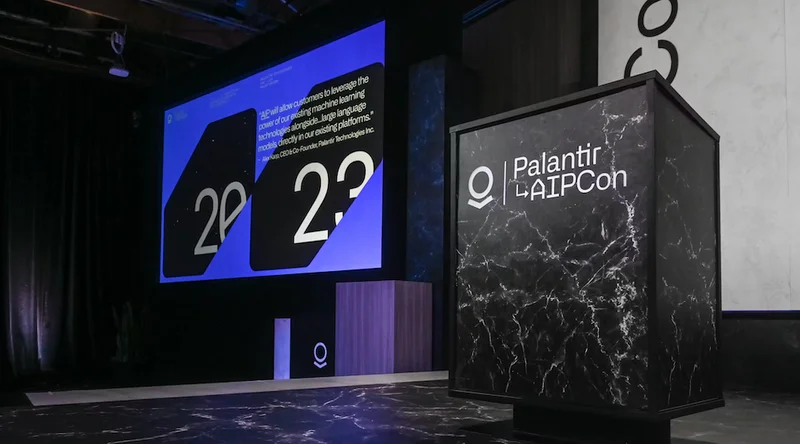Palantir's "Scary" CEO and Nvidia's AI Boom: A Glimpse into Our Hopeful Future?
Okay, friends, let's dive into something truly fascinating. We've got Palantir, a company some are calling the "scariest in the world," led by a CEO who's giving even Musk and Zuckerberg a run for their money in the eccentricity department. Then we've got Nvidia, riding high on the AI wave, but facing questions after Palantir's recent earnings report dip. But I think, let's not get caught up in the fear. Let's look at the bigger picture here.
The Real Story Isn't Fear, It's Potential
You see, Palantir, despite the Big Brother comparisons, is at the heart of some of the world's most pressing issues. Their AI-powered data analysis is being used by governments and corporations alike. Now, I know what you’re thinking: surveillance, potential for abuse, all that scary stuff. But hear me out. The journalist Michael Steinberger, who wrote a new biography of Karp, says that there are “some fundamental misconceptions about the work they do. They don’t collect the data, they don’t store the data; they provide software that helps companies and organizations make better use of their own data.” And that’s the thing, right? The potential for good is just as immense as the potential for misuse.
It's like fire. Fire can warm your home and cook your food, or it can burn everything to the ground. The tool itself isn’t the problem; it’s how we choose to wield it. And that's where the conversation needs to be focused. How do we ensure these powerful technologies are used ethically and responsibly? What kind of guardrails do we need to put in place, and how do we verify that they're actually effective? These are the questions we should be asking.
And then there's Nvidia. After Palantir's recent earnings report, some investors are nervous. Is Palantir's Latest Earnings Report a Warning for Nvidia Investors? I don't think so. Nvidia has consistently exceeded expectations, and the demand for AI infrastructure is only growing. In fact, Nvidia's chief, Jensen Huang, spoke recently of orders for its AI platforms, with total cumulative shipments of the current Blackwell platform, the upcoming Rubin system, and networking equipment over this year and 2026 so far totaling $500 billion. That’s not a cooling trend; that’s an explosion! The AI revolution is only just beginning, and Nvidia is at the forefront.
Here’s the thing: Palantir and Nvidia, in their own ways, represent the incredible power of technology to shape our world. Palantir gives organizations the ability to see patterns and make decisions with unprecedented speed and accuracy – it's about taking the overwhelming chaos of data and turning it into actionable insights. Nvidia, on the other hand, is literally building the engines that power the AI revolution.

This reminds me of the early days of the internet. Remember all the fear-mongering back then? People worried about online predators, misinformation, and the erosion of privacy. And yes, those are still valid concerns. But look at all the good that the internet has brought us: instant access to information, global connectivity, and countless opportunities for innovation and creativity. The internet isn't inherently good or bad; it's a tool, and it's up to us to shape its use.
And I think the same is true of AI. It's a powerful tool, and we need to be mindful of its potential risks. But let's not let fear paralyze us. Let's focus on the incredible opportunities that AI presents. Imagine a world where diseases are diagnosed earlier and more accurately, where personalized education helps every child reach their full potential, where sustainable energy solutions are optimized for maximum efficiency, where governments can quickly and efficiently respond to crises… I mean, the possibilities are truly endless, aren't they?
When I saw the demo, I just sat back in my chair, speechless. This is the kind of breakthrough that reminds me why I got into this field in the first place.
Of course, we also need to be aware of the ethical implications. As Palantir’s own CEO, Alex Karp, seems to be grappling with, what does it mean to "defend the West" in the 21st century? How do we ensure that AI is used to promote justice and equality, rather than to reinforce existing power structures? These are tough questions, and we need to have an open and honest dialogue about them. But I believe that we're up to the challenge.
The Dawn of a Brighter Tomorrow
So, what does this all mean? It means that we're on the cusp of a technological revolution that has the potential to transform our world for the better. It means that we need to be vigilant about the ethical implications of these technologies, but we also need to embrace their potential for good. It means that companies like Palantir and Nvidia are not just building software and hardware; they're building the future. And I, for one, am incredibly excited to see what that future holds.
